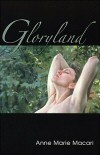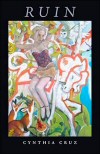“Gloryland” and “Ruin,” two reviewed works
 |
 |
Gloryland, by Anne Marie Macari. Alice James Books (September 30, 2005). 75pp. paperback $14.95 ISBN 1882295501 Ruin, by Cynthia Cruz. Alice James Books (September 1, 2006). 80pp. paperback $14.95 ISBN 1882295587 Reviews by George Leonard |
From that strange house, Alice James Press, which consistently offers remarkable works that defy poetic fashion, come almost in the same mail, two books which reflect upon each other, and a central problem in poetry– and in the criticism of it: Gloryland by Anne Marie Macari and Ruin, by Cynthia Cruz. If I hadn’t read Macari’s work back to back with Cruz’s, I might have liked the Cruz better. The two titles offer an illuminating contrast: gloryland versus ruin.
Of the pair, Cruz is the power hitter. The dust jacket proudly informs me that she is “the recipient of several residencies to Yaddo and the Mac Dowell Colony. She lives in New York City.” Macari, though her first book, Ivory Cradle, “won the APR/Honickman first book prize in 2000,” is less well known, though she has been in TriQuarterly and The Iowa Review. Cruz, by contrast (BA Mills College, Sarah Lawrence MFA), has appeared in Paris Review, Boston Review, GRAND STREET and so forth, and made it into two anthologies.
I underline that Cruz is no tyro because my comments otherwise might sound harsh. The reader, who is also probably a writer (does any grownup but another poet still read poetry in 2007?) knows the situation. In the writer’s workshop, a woman begins reading a work, which the other members realize with discomfort is a kind of elegy.
The elegy is certainly a central poetic genre. John D. Rosenberg, in his magisterial summing up of the Victorians, “Elegy for an Age,” said that the elegy had even been their central genre, as all that was solid melted into air. Yet what a strange genre it is. Tennyson included stanzas in In Memoriam in which he pictured people criticizing him for parading his grief. His reply simply was, “I only sing because I must,” the way even a bird sings at the death of its mate. “Short swallow flights of song, that dip/ Their wings in tears, and skim away.”
The workshop, listening, wants to extend its human sympathy, but the very act of being presented with the grief as poetry demands a response to it as poetry. The grief must have permutated into poetry, before we can criticize it as such. Not enough time has gone by here, apparently.
“You say there are no words in the English language/ For the dark flocking of your sadness.” (Microscopic Winter II) The dark flocking of what? I want to like the poems. The narrative thread that holds them together is her brother’s suicide. One would think that this is powerful material to work with, but the fact that we’ve been presented with poems forces us to ask, where’s the poetry? “Murderous, bloody-nosed brother, it was you/ Who made me. I don’t blame you.” (January 5, 1973) “His hands were moving like twin engines/ But his lips unzipped my pants” (Traveling Gospel).
These lines alternate with laments about Cruz’s own condition, comments, alas, so familiar they could be taken from an Avril Lavigne song. “As a girl, I was razored/ Into the world. I was never close to anyone./ World of wingless, world of hands, I killed off everything I loved./Do not talk to me about the stars.” (Prelude to 220, or 110). Cruz needs more time to work the grief through. She is still stuck in the very human stage where the whole world is seen through one’s loss. “Someone’s mother’s pick-up’s parked/ With a glue-sniffing family/ Of kids inside. And everyone is dead/ In my America.” (Toby II) In her America, perhaps. But even a professional reviewer feels inhuman, saying of a woman’s grief over her brother, “Your comments are familiar.” As Tennyson admitted, “Never morning wore to evening but some heart did break.” The elegy then, poses the tremendous challenge of making grief new.
–Yeah, well, I still feel like a louse telling Cruz my opinion of these poems, but I won’t insult a well-known poet by praising her work as “sincere,” as if she were a sophomore with black fingernail polish reading to a class. Cruz is a pro. She can take it. In time, the grief may diminish to a point where poetry about her brother is possible for her. As a John Cage partisan, I cannot accept or even condone her attack on life.
By contrast to Cruz’s versifications of familiar arguments, there is the sharp vision in Macari’s poem “Horseshoe Crabs,” “Their bodies float to shore and he dashes/ to collect them, upending them to dry,/ all their feet walking the wind.” I had seen those crabs do that a thousand times, growing up in Long Island, yet the image was entirely fresh to me. Even her word “wind” is precise. Those crabs are animals of the bay, a place where enormous winds always blow.
In Book One, she makes Eve new again: “Light was being, held by her own hands or/ touched like water burning bare skin./ In the beginning meant learning to see: a thousand/ kinds of green, the vine-crawl along rocks,/ the groping mouths of flowers. In the beginning/ all they knew was yes, so when the first no/ settled quietly around the tree/ they though it was birdsong . . .” These are thoughts and emotions I cannot find by turning on Live105 and listening along with my son while I drive him to school.
Macari has a great range, too. I enjoyed “Madame Sherri’s House.” “If it was really a bordello, as the locals say,/ why build in the woods, miles from nowhere?/ And what’s the crime in wearing feathers/ or going naked under a fur coat?” And then the final irony in the poem called “Gloryland,” (“I’ve got a home in Gloryland that outshines the sun”– African-American spiritual). “And what of my brother, dead, who clowning/ held a gun to his head and blew himself/ into the nebula sac while someone cried/ come back . . .” So Macari has been in exactly the same place that Cruz (or her narrator) has been. But she took her time. She is back in the light, and her joy wasn’t earned cheaply; it is the joy of someone who has come out the other side.